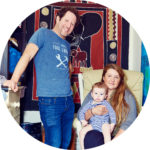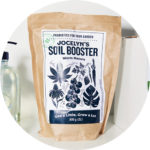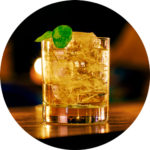
The Diaper Warriors
This family has rejected plastics, packaging and other landfill fodder in pursuit of a low-impact lifestyle
Who they are: Ryan Dyment, 39, finance director at EcoSchools Canada, Emily Hunter, 35, an event planner, and Phoenix, nine months
Where they live: Beaches
Zero-wasters since: January 2015
Monthly waste: One small grocery bag
What inspired you to go zero waste:
We’ve been steadily reducing our waste since 2015. However, since we had a baby last year, Emily and I took things up a notch.
The easiest part of pursuing a zero-waste lifestyle:
The baby. He seems perfectly happy to use reusable products.
Three items that are banned in your home:
Disposable diapers, squeezable food snacks and new toys.
Three items that you own a lot of:
We have 25 reusable diapers and about 25 reusable baby wipes. Definitely way too many toys, though they were all used or gifts.
Items you always carry with you:
Reusable zippered bag for dirty diapers and containers for baby food and milk.

Guilty pleasure you can’t give up:
Emily cannot resist shopping on Amazon for who-knows-what. She tries to hide the boxes and credit card statements so I don’t see what’s purchased while I’m at work.
Waste-free product or service that you most wish was available in Toronto:
Medical products for babies, such as skin creams and different oils and medicines. For now, we try to find packaging that can be recycled.
Sustainable habit you are most proud of:
Diapers are the biggest waste item for babies by far, and that’s what we prioritized from day one. The City of Toronto permits diapers in the compost bin, but only the fibre and organic matter are composted. The plastic ends up in the landfill. If parents switched to one or two reusable diapers per day, it would make a huge difference.
Your most ingenious zero-waste life hack:
We started a workshop called Diaper Dad to educate parents on the impact of baby waste and how to raise a zero-waste child. Beyond diapers, a bidet attachment for your toilet or shower makes the cleaning process easy and quick.

Omnivore, vegetarian, vegan or other:
We’re vegetarian.
Where you buy groceries:
Bulk stores and my local grocery stores. I could definitely do better when it comes to food, but I try to stay away from plastic if given the option. In the warmer months, we go to the Leslieville Farmers’ Market or the Evergreen Brickworks, where we can be almost exclusively zero waste.
What you use for cleaning:
We use vinegar as our all-purpose cleaner. We also use dishwasher pods from a company called Seventh Generation and washing machine strips from Tru Earth, which has compostable packaging. These are not perfectly zero-waste but are much better than most cleaners.
Where you buy clothes:
Used clothing shops and swaps.
Products you make at home:
I mostly fix broken products at home rather than make much from scratch. I have gotten quite good at electronics and sew clothes as well. We do a lot of cooking, as take-out packaging is simply too wasteful.

Reusable toilet paper—yea or nay:
Nay.
Main mode of transportation:
TTC, and biking in the warmer months.
How often you drive:
Two or three times per week.
How often you fly:
Once or twice a year.
How much waste do you produce in a typical month:
We have a large city bin but rarely fill it, for a household of five—the three of us and two tenants. The baby produces practically nothing.
Who is your zero hero:
The Nappy Lady, a zero-waste leader in New Zealand.
Best zero-waste tip for child care:
Start with reusable diapers and wipes, even if it’s just a few times per week. Build your system from there and it becomes much easier to eliminate more waste as you go.
How often do you…
Use AC or heating: Regularly.
Eat out: Two to three times per week.
Use the dishwasher: Daily.
Do laundry: With the baby’s clothing and diapers, about three loads per week.
On a scale of 1 to Greta Thunberg, your sustainability score:
No more than a 7. There’s lots of room to improve!
The Green Guide

Part 1: The sustainability sisters—Toni and Lin Sappong, zero-wasters since March 2018

Part 2: The diaper warriors—Ryan Dyment and Emily Hunter, zero-wasters since January 2015

Part 3: The queen of green—Meera Jain, zero-waster since March 2018

Part 4: A sustainable sanctuary in Leslieville

Part 5: A lakeside eco-retreat

Part 6: A natural oasis in Midtown

Part 7: How one super turned his building into a miraculously low-waste condo

Part 8: Incredible bulk—four packaging-free shops

Part 9: Supernova Ballroom—the low-waste cocktail bar

Part 10: “I went green—maybe a little too green“

Part 11: The green shopping guide—guilt-free goodies for climate-conscious consumers
This story originally appeared in the March 2020 issue of Toronto Life magazine. To subscribe, for just $29.95 a year, click here.





